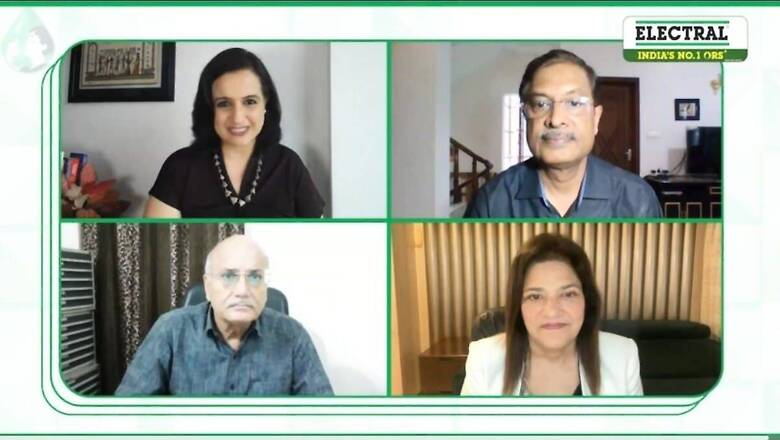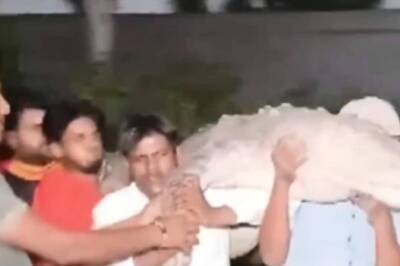
views
In India, we are no stranger to diarrhoeal disease. Escalating climate change is strengthening India’s monsoons, which brings increased flood risks to our cities, which bring increased incidences of waterborne diseases, including diarrhoea.
For most adults, a bout of diarrhoea is nothing to worry about. For younger children and vulnerable adults though, diarrhoea can take on more serious hues. According to the WHO, we lose 525,000 children under the age of five, to diarrhoea each year. What makes this doubly tragic is that these deaths are almost entirely preventable.
The most severe threat posed by diarrhoea is dehydration. If we tackle dehydration appropriately, we improve outcomes dramatically. According to the World Health Organisation (WHO), this mortality rate can be brought down to less than one per cent by simple interventions like effective and timely case management. In simple terms, this involves administering an Oral Rehydration Solution (ORS).
ORS has reliably shown life-saving effects in conditions involving dehydration since it was discovered in the 1960s. WHO, through various studies over the years, has refined and perfected the formula for rehydration: the perfect ratio of salts, minerals and electrolytes our bodies need to recover from dehydration. In India, this formulation has been available since 1972, in the form of Electral.
Network 18 & ELECTRAL have joined hands to increase awareness on this very issue of Diarrhoeal Dehydration. The Hydration for Health campaign aims to sensitise the common man by building necessary communication around everyday hydration, hydration myths and common missteps, and what to do when dehydration strikes.
On the occasion of World ORS Day on July 29th, Network18’s Mughda Kaira spoke with Dr. Indu Khosla, MD, DCH, RCPCH Fellow in Pediatric Pulmonology, Dr. Raj Tilak, MBBS, MD (Pediatrics), Consultant Paediatrician & Pulmonologist, Dr. Hemant Jain, Ex-Professor and Head of Pediatrics, MGM Medical College, Indore about the various aspects of dehydration in children, and how to recognise and administer WHO ORS effectively.
What Causes Dehydration?
According to Dr Jain, the most common cause of dehydration is diarrhoea, which in turn, is one of the most common causes of mortality in India, for children under the age of 5. The second most common cause he sees in his daily practice is high-grade fever. Each degree of fever over 38 degrees needs to be compensated with 10% more fluid intake – something that most of us don’t realise. The third most common condition is vomiting, where we lose a lot of fluid and electrolytes, and often, do so very quickly. The fourth are burns, which again, cause loss of fluid from the body.
Dr Tilak also talked about other causes like sweating due to heat stress or hyperthermia, which is common during our summer season. He also drew attention to Dengue fever, which can cause fluid to shift to other parts of the body where it is not required.
In this context, Dr Khosla spoke about how avoidable diarrhoeal deaths amongst children are. She quoted from a survey that showed that only 40-50% of children who have diarrhoea actually consume ORS. Considering that 10% of children who develop diarrhoea die, addressing the awareness gap around ORS’ role takes on paramount importance.
What is WHO ORS, and how is it different from other drinks?
Hydration isn’t just about how much water one drinks. It is about maintaining fluid balance – the right amount of electrolytes that help keep the body running efficiently. As Dr Khosla explains, when we lose water from our bodies, we also lose essential salts like sodium, potassium, and chloride, making the body acidic. ORS is a solution that contains these electrolytes like sodium, potassium, chloride along with glucose and sodium citrate to restore the body’s acidic balance.
Dr Tilak notes that the key to an effective ORS is the right concentration of every single ingredient. The WHO has spent decades researching the right combination of ingredients in the right proportion, and that formulation is labelled as WHO ORS. Giving a child fizzy or carbonated drinks instead of a WHO ORS can be detrimental because of the high sugar content in these drinks. This sugar content puts an enormous load on the intestines of the dehydrated child, often causing even more dehydration. Dr Tilak sums it up perfectly when he says, “The replacement for WHO ORS is only WHO ORS and nothing else."
How can we administer ORS effectively?
Dr Tilak reiterates the importance of administering and preparing the correct dose. It is imperative that we follow the specific proportions mentioned on the packet, as these are defined by the WHO. At the moment, WHO ORS like Electral is available in two sizes – the large packet is meant to be dissolved in one litre of water, and the small packet is meant to be dissolved in 200ml, or one cup of water.
It is important to note that it is only the correct proportion of these salts and the right dilution that gives us the results we want. Adding more or less Electral to water lowers its efficacy. This is why the third option exists – Ready to Drink Electral that is available in tetra pak form.
Dr Khosla recommends administering ORS in mild to moderate dehydration, but cautions that if the child is vomiting, or unable (or unwilling) to drink, it might be time to take the child to the doctor. Giving ORS to an unconscious child is not recommended, as it can lead to more vomiting and aspiration, making the situation worse.
Dr Jain also pointed out that while their conversation has centred around children, ORS is equally effective for adults with dehydration. WHO ORS, properly prepared and taken at the right time can stave off dehydration in its early stages, preventing the need for IV fluids and hospitalisation. The myth that WHO ORS is only for children often keeps adults from taking ORS themselves. This is patently wrong – WHO ORS is extremely helpful for battling dehydration across all ages, and is particularly useful for vulnerable elders who face similar risks of death through dehydration, as children do.
Conclusion
Dehydration, whether from diarrhoea or other causes is treatable, and deaths from dehydration are absolutely preventable through timely administration of WHO ORS. In India, WHO ORS has been available to us since 1972 in the form of Electral, and has saved countless lives of children and adults. However, the awareness gap still exists.
You can watch the full panel discussion here (link). For more details on diarrhoeal dehydration, and to learn how to recognise and prevent dehydration in yourself and your loved ones, visit https://www.news18.com/electralhydrationforhealth/
This is a partnered post.



















Comments
0 comment